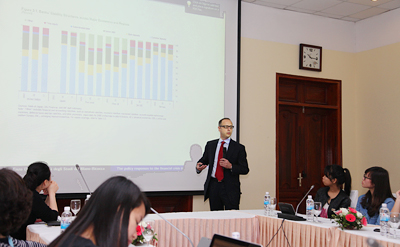
Dr. Enzo Dia speaks at the seminar
On March 26th 2014, the UEB faculty members have attended a seminar on the policy responses to the financial crisis in the United States and Europe with Dr. Enzo Dia (specialist, University of Milano Bicocca, Italia).
Dr. Enzo Dia visited the VNU University of Economics and Business (the UEB) as the acceptance of the invitation by Dr. Marion Fischer, EU Project Manager on Diplomacy and Public Approach. At the seminar, Dr. Fischer and the project officers shared their desire to provide information and more knowledge about the European Union to other countries. The delegation was pleasure to introduce the UEB Dr. Enzo Dia at the talk about the same topic.
During the seminar, the UEB faculty members and students listened to a presentation by Dr. Enzo Dia on financial crisis in the United States and Europe as well as the management of these state for the banking system to resolve the crisis.

Dr. Marion Fischer - EU Project Manager in Vietnam
On the basis of comparing activities of banking system in some representative countries and regions as: the United States, Euro Zone, Japan, Asia, etc. the presentation analyzed the differences of the crisis n the United States, Europe and other regions.
Analyzing the causes of financial crisis in the United States and Europe, Dr. Dia argued that it was because of the failure in raising and managing capital of commercial banking system. In particular, they promoted people to get a loan while their financial ability was not strong enough; the banks themselves also lent more than they had from people’s deposits. In other words, the amount should have been focused on the manufacturing sector, while it was poured into the real estate market. During that period, these states also made the mistake when creating apparent safety for the commercial banks to promote people’s loans.
The financial crisis, therefore, has affected strongly to global trade and acerbate the existing economic slowdown.
Enzo Dia continued the analysis and assessment of the policy responding to the crisis in these countries. In the United States, the crisis was resolved promptly by the nationalization of several banks and bankrupted inefficient banks. In Europe, the crisis was more complex and lasting due to the feeble intervention of the European Central Bank (ECB) and the requirement of government’s autonomy of each country.
Until now, with the response of the ECB and the change of commercial banks, the situation in Europe has been improved. However, the reforms in banking system continues in the United States and Europe to tackle the crisis more thoroughly.
To conclude his presentation, Dr. Enzo Dia provided some lessons learned from the financial crisis in the United States and Europe. The recovery policy instruments and institutions could cause certain losses, said the speaker. Besides, it is necessary to use legal instruments to prevent banks from lending too much, leading to the large source of debts and abnormal rapid growth for the banks. Dr. Enzo thought that each state should not hold too many public debts, of which the reduction should be taken when the economy is wholesome.
Discussing after the presentation, the UEB faculty members and students have raised their questions and suggested more issues to learn more about the financial crisis in Europe and the United States and their implications to Vietnam’s context.